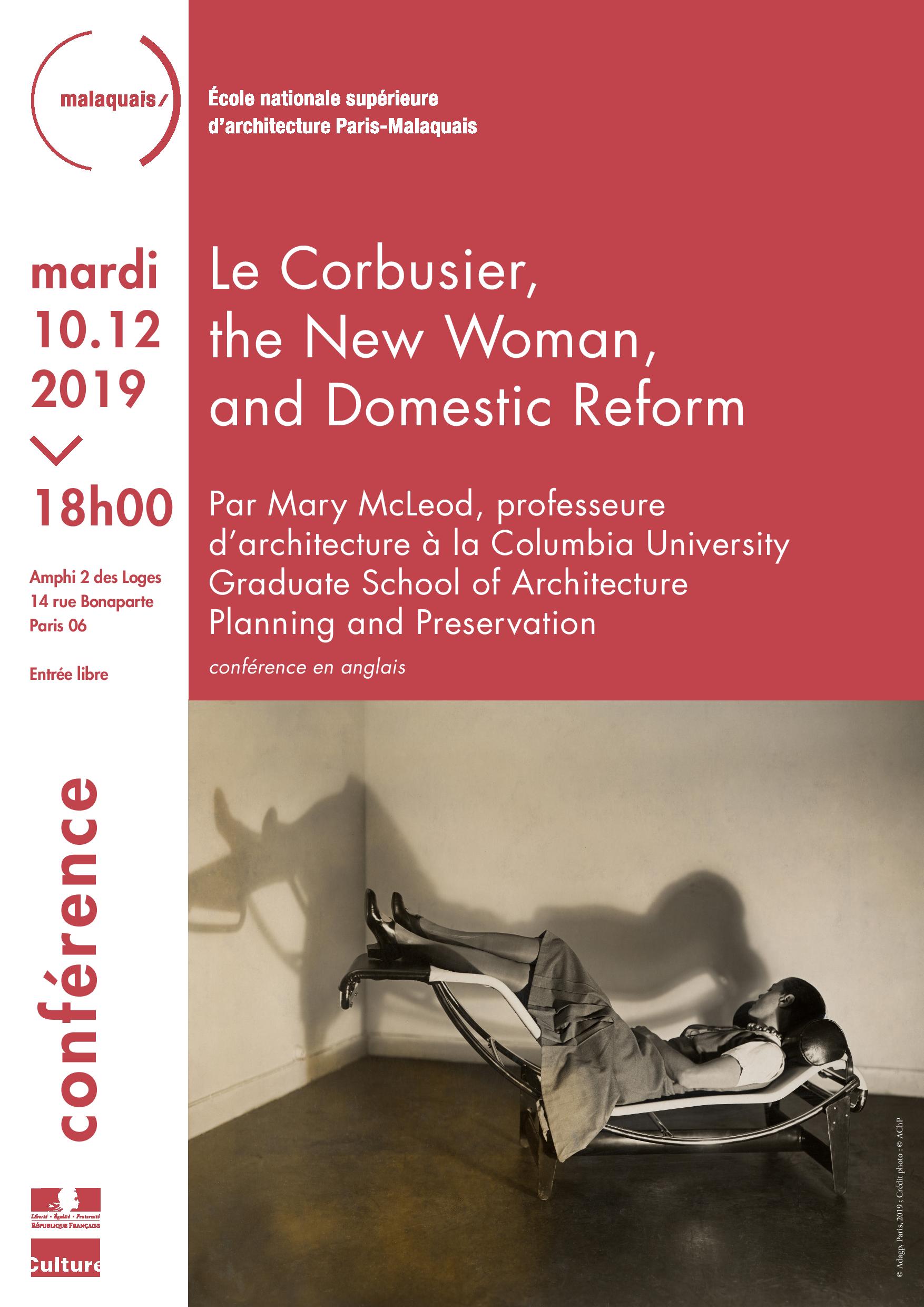Le Corbusier, the New Woman, and Domestic Reform / Le Corbusier, la femme nouvelle, et la réforme domestique – Conférence par Mary McLeod (en anglais)
10 Dec 2019
Le mardi 10 décembre à 18h00
Conférence en anglais
Entrée libre dans la limite des places disponibles
ENSA Paris-Malaquais – 14 rue Bonaparte – Paris 6e
Amphithéâtre 2 des Loges
« La femme nous a précédés. Elle a réalisé la réforme de son costume. Elle s’était trouvée dans cette impasse : suivre la mode et renoncer alors à l’apport des techniques modernes, à la vie moderne. Renoncer au sport et, problème plus matériel, ne pas pouvoir prendre les emplois qui ont fait à la femme une part féconde dans l’activité contemporaine et lui permettent de gagner sa vie (…) Pour réaliser la construction quotidienne de sa toilette : coiffure, bottes, boutonnage de la robe, elle n’aurait plus eu le temps de dormir.
Alors la femme a coupé ses cheveux, et ses jupes, et ses manches. Elle s’en va tête nue, bras nus, jambes libres. Et en cinq minutes, elle s’habille. Et elle est belle : elle nous séduit du charme de ses grâces dont les couturiers ont admis de tirer parti.
Le courage, l’entrain, l’esprit d’invention avec lesquels la femme a opéré sa révolution vestimentaire sont un miracle des temps modernes. Merci !
Nous les hommes ? Maussade question ! En habit, nous avons l’air de généraux de la Grande Armée et nous portons des cols empesés ! En costume de travail, nous sommes gênés. »
–Le Corbusier, Précisions, 1930
« La cuisine devient une des pièces essentielles de la maison »
–Le Corbusier, Œuvre complète, 1929-34, 1935.
————————
« Woman has got there before us. She has brought about the reform of her dress. She found herself in this dilemma: to follow fashion and by doing so give up what modern technology–modern life–had to offer. To give up sport and, more materially, the chance of employment, which has given her a productive role in modern life and enabled her to earn her living…To carry out the daily construction of her toilet: hairdo, boots, buttoning her dress, she would have had to give up sleeping.
So woman cut off her hair and her skirts and her sleeves. She goes around bare-headed, bare-armed, with her legs free and she can dress in five minutes. Moreover, she is beautiful; she enchants us with the grace of her figure…
The courage, the enterprise, the inventive spirit with which woman has revolutionized her dress are a miracle of modern times. Thank you!
What about us men? A dismal state of affairs! In our clothes, we look like generals of the Grand Army and we wear starched collars! We are uncomfortable… »
–Le Corbusier, Précisions, 1930
« The kitchen becomes one of the essential rooms of the house. »
–Le Corbusier, Œuvre complète, 1929-34, 1935.
La conférence de Mary McLeod « Le Corbusier, la femme nouvelle et la réforme domestique » explorera la relation entre l’architecture de Le Corbusier et l’émergence de la femme nouvelle en France après la Première Guerre mondiale. Mme McLeod examinera comment les évolutions des identités de genre et des conditions sociales (telles que le travail des femmes et la « crise du service domestique ») ont affecté la vision que Le Corbusier avait de la vie domestique. Elle traitera aussi de l’influence de Charlotte Perriand sur les projets de l’atelier, ainsi que l’impact du mouvement de réforme domestique émergeant en Allemagne et en France (notamment les écrits de Paulette Bernège) sur le regard que Le Corbusier portait sur la vie moderne. Seront également abordés la nouvelle importance que la cuisine acquît dans le travail du Corbusier à la fin des années 1920, et le projet charnière de l’appartement du Salon d’Automne de 1929. Dans le cadre de sa conférence, Mme McLeod présentera un court métrage de 1931, « L’architecture d’aujourd’hui » de Pierre Chenal, dans lequel Le Corbusier expose trois de ses villas de la fin des années 1920.
————————
Mary McLeod’s lecture “Le Corbusier, the New Woman, Domestic Reform” will explore the relationship between Le Corbusier’s architecture and the emergence of the New Woman in France after World War I, examining how changing gender identities and social conditions (such as women working and the so-called servant crisis) affected Le Corbusier’s vision of domestic living in the 1920s. She will address the influence of Charlotte Perriand on the atelier’s designs, as well as the impact of an emerging domestic reform movement in Germany and France (especially the writings of Paulette Bernège) on Le Corbusier’s view of modern living. One theme that will be considered is the new importance that the kitchen gained in his work in the late 1920s. The Salon d’Automne apartment of 1929 will be discussed as a pivotal project. As part of her lecture, she will show a short film of 1931, Pierre Chenal’s « L’architecture d’aujourd’hui », in which Le Corbusier presents three of his villas from the late 1920s.
Architecte et historienne de l’architecture, Mary McLeod est professeure d’architecture à la Columbia University Graduate School of Architecture, Planning and Preservation (GSAPP), où elle enseigne l’histoire et la théorie de l’architecture et, à l’occasion, le projet. Elle a également enseigné à Harvard University, à l’University of Kentucky, à l’University of Miami et à l’Institute for Architecture and Urban Studies. Ses recherches et publications portent sur l’histoire du mouvement moderne et sur la théorie de l’architecture contemporaine, ainsi que sur le féminisme et l’architecture, en examinant des questions relatives aux liens entre l’architecture et l’idéologie.
Mme McLeod a co-dirigé les ouvrages « Architecture, Criticism, Ideology » et « Architecture Reproduction ». Elle a dirigé et contribué à la monographie « Charlotte Perriand: An Art of Living », et a initié et contribué au commissariat de l’exposition « Charlotte Perriand: Interior Equipment » à l’Urban Center de New York. Ses articles ont paru dans « Assemblage », « Oppositions », « Art Journal », « AA Files », « JSAH », « Casabella », « Harvard Design Magazine » et « Lotus », ainsi que dans d’autres revues et anthologies, telles que « The Sex of Architecture », « Architecture in Fashion », « Architecture of the Everyday », « Architecture and Feminism », « The Pragmatist Imagination », « The State of Architecture », « Fragments: Architecture and the Unfinished », « Architecture Theory since 1968 », « Oppositions Reader », « Le Parole dell’Architettura », et « Modern Women: Women Artists at The Museum of Modern Art ». Elle est la co-rédactrice, avec Victoria Rosner, du site « Pioneering Women of American Architecture ». Mary McLeod a reçu de nombreuses bourses et récompenses, dont une bourse Fulbright, un prix du National Endowment for the Humanities, ainsi que des subventions du New York Council of the Arts et de la Graham Foundation.
————————
Mary McLeod is a Professor of Architecture at Columbia GSAPP, where she teaches architecture history and theory, and occasionally studio. She has also taught at Harvard University, University of Kentucky, University of Miami and the Institute for Architecture and Urban Studies. Her research and publications have focused on the history of the modern movement and on contemporary architecture theory, examining issues concerning the connections between architecture and ideology.
McLeod is co-editor of « Architecture, Criticism, Ideology » and « Architecture Reproduction », and is the editor of and contributor to the book « Charlotte Perriand: An Art of Living ». She also initiated and helped curate the exhibition « Charlotte Perriand: Interior Equipment », held at the Urban Center in New York. Her articles have appeared in « Assemblage », « Oppositions », « Art Journal », « AA Files », « JSAH », « Casabella », « Art Journal », « Harvard Design Magazine » and « Lotus » as well as other journals and anthologies, such as « The Sex of Architecture », « Architecture in Fashion », « Architecture of the Everyday », « Architecture and Feminism », « The Pragmatist Imagination », « The State of Architecture », « Fragments: Architecture and the Unfinished », « Architecture Theory since 1968 », « Oppositions Reader », « Le Parole dell’Architettura », and « Modern Women: Women Artists at The Museum of Modern Art ». She has received numerous fellowships and awards, including a Fulbright Fellowship, NEH award, and grants from New York Council of the Arts and the Graham Foundation.
Photo d’illustration : Charlotte Perriand sur la Chaise longue basculante, 1929 – © Adagp, Paris, 2019 ; Crédit photo : © AChP
Note post-conférence :
Pour la communauté de l’école, la captation vidéo de cette conférence est accessible sur le site intranet en cliquant ici (accès réservé aux membres de l’ENSA Paris-Malaquais).
Le mardi 10 décembre à 18h00
Conférence en anglais
Entrée libre dans la limite des places disponibles
ENSA Paris-Malaquais – 14 rue Bonaparte – Paris 6e
Amphithéâtre 2 des Loges
« La femme nous a précédés. Elle a réalisé la réforme de son costume. Elle s’était trouvée dans cette impasse : suivre la mode et renoncer alors à l’apport des techniques modernes, à la vie moderne. Renoncer au sport et, problème plus matériel, ne pas pouvoir prendre les emplois qui ont fait à la femme une part féconde dans l’activité contemporaine et lui permettent de gagner sa vie (…) Pour réaliser la construction quotidienne de sa toilette : coiffure, bottes, boutonnage de la robe, elle n’aurait plus eu le temps de dormir.
Alors la femme a coupé ses cheveux, et ses jupes, et ses manches. Elle s’en va tête nue, bras nus, jambes libres. Et en cinq minutes, elle s’habille. Et elle est belle : elle nous séduit du charme de ses grâces dont les couturiers ont admis de tirer parti.
Le courage, l’entrain, l’esprit d’invention avec lesquels la femme a opéré sa révolution vestimentaire sont un miracle des temps modernes. Merci !
Nous les hommes ? Maussade question ! En habit, nous avons l’air de généraux de la Grande Armée et nous portons des cols empesés ! En costume de travail, nous sommes gênés. »
–Le Corbusier, Précisions, 1930
« La cuisine devient une des pièces essentielles de la maison »
–Le Corbusier, Œuvre complète, 1929-34, 1935.
————————
« Woman has got there before us. She has brought about the reform of her dress. She found herself in this dilemma: to follow fashion and by doing so give up what modern technology–modern life–had to offer. To give up sport and, more materially, the chance of employment, which has given her a productive role in modern life and enabled her to earn her living…To carry out the daily construction of her toilet: hairdo, boots, buttoning her dress, she would have had to give up sleeping.
So woman cut off her hair and her skirts and her sleeves. She goes around bare-headed, bare-armed, with her legs free and she can dress in five minutes. Moreover, she is beautiful; she enchants us with the grace of her figure…
The courage, the enterprise, the inventive spirit with which woman has revolutionized her dress are a miracle of modern times. Thank you!
What about us men? A dismal state of affairs! In our clothes, we look like generals of the Grand Army and we wear starched collars! We are uncomfortable… »
–Le Corbusier, Précisions, 1930
« The kitchen becomes one of the essential rooms of the house. »
–Le Corbusier, Œuvre complète, 1929-34, 1935.
La conférence de Mary McLeod « Le Corbusier, la femme nouvelle et la réforme domestique » explorera la relation entre l’architecture de Le Corbusier et l’émergence de la femme nouvelle en France après la Première Guerre mondiale. Mme McLeod examinera comment les évolutions des identités de genre et des conditions sociales (telles que le travail des femmes et la « crise du service domestique ») ont affecté la vision que Le Corbusier avait de la vie domestique. Elle traitera aussi de l’influence de Charlotte Perriand sur les projets de l’atelier, ainsi que l’impact du mouvement de réforme domestique émergeant en Allemagne et en France (notamment les écrits de Paulette Bernège) sur le regard que Le Corbusier portait sur la vie moderne. Seront également abordés la nouvelle importance que la cuisine acquît dans le travail du Corbusier à la fin des années 1920, et le projet charnière de l’appartement du Salon d’Automne de 1929. Dans le cadre de sa conférence, Mme McLeod présentera un court métrage de 1931, « L’architecture d’aujourd’hui » de Pierre Chenal, dans lequel Le Corbusier expose trois de ses villas de la fin des années 1920.
————————
Mary McLeod’s lecture “Le Corbusier, the New Woman, Domestic Reform” will explore the relationship between Le Corbusier’s architecture and the emergence of the New Woman in France after World War I, examining how changing gender identities and social conditions (such as women working and the so-called servant crisis) affected Le Corbusier’s vision of domestic living in the 1920s. She will address the influence of Charlotte Perriand on the atelier’s designs, as well as the impact of an emerging domestic reform movement in Germany and France (especially the writings of Paulette Bernège) on Le Corbusier’s view of modern living. One theme that will be considered is the new importance that the kitchen gained in his work in the late 1920s. The Salon d’Automne apartment of 1929 will be discussed as a pivotal project. As part of her lecture, she will show a short film of 1931, Pierre Chenal’s « L’architecture d’aujourd’hui », in which Le Corbusier presents three of his villas from the late 1920s.
Architecte et historienne de l’architecture, Mary McLeod est professeure d’architecture à la Columbia University Graduate School of Architecture, Planning and Preservation (GSAPP), où elle enseigne l’histoire et la théorie de l’architecture et, à l’occasion, le projet. Elle a également enseigné à Harvard University, à l’University of Kentucky, à l’University of Miami et à l’Institute for Architecture and Urban Studies. Ses recherches et publications portent sur l’histoire du mouvement moderne et sur la théorie de l’architecture contemporaine, ainsi que sur le féminisme et l’architecture, en examinant des questions relatives aux liens entre l’architecture et l’idéologie.
Mme McLeod a co-dirigé les ouvrages « Architecture, Criticism, Ideology » et « Architecture Reproduction ». Elle a dirigé et contribué à la monographie « Charlotte Perriand: An Art of Living », et a initié et contribué au commissariat de l’exposition « Charlotte Perriand: Interior Equipment » à l’Urban Center de New York. Ses articles ont paru dans « Assemblage », « Oppositions », « Art Journal », « AA Files », « JSAH », « Casabella », « Harvard Design Magazine » et « Lotus », ainsi que dans d’autres revues et anthologies, telles que « The Sex of Architecture », « Architecture in Fashion », « Architecture of the Everyday », « Architecture and Feminism », « The Pragmatist Imagination », « The State of Architecture », « Fragments: Architecture and the Unfinished », « Architecture Theory since 1968 », « Oppositions Reader », « Le Parole dell’Architettura », et « Modern Women: Women Artists at The Museum of Modern Art ». Elle est la co-rédactrice, avec Victoria Rosner, du site « Pioneering Women of American Architecture ». Mary McLeod a reçu de nombreuses bourses et récompenses, dont une bourse Fulbright, un prix du National Endowment for the Humanities, ainsi que des subventions du New York Council of the Arts et de la Graham Foundation.
————————
Mary McLeod is a Professor of Architecture at Columbia GSAPP, where she teaches architecture history and theory, and occasionally studio. She has also taught at Harvard University, University of Kentucky, University of Miami and the Institute for Architecture and Urban Studies. Her research and publications have focused on the history of the modern movement and on contemporary architecture theory, examining issues concerning the connections between architecture and ideology.
McLeod is co-editor of « Architecture, Criticism, Ideology » and « Architecture Reproduction », and is the editor of and contributor to the book « Charlotte Perriand: An Art of Living ». She also initiated and helped curate the exhibition « Charlotte Perriand: Interior Equipment », held at the Urban Center in New York. Her articles have appeared in « Assemblage », « Oppositions », « Art Journal », « AA Files », « JSAH », « Casabella », « Art Journal », « Harvard Design Magazine » and « Lotus » as well as other journals and anthologies, such as « The Sex of Architecture », « Architecture in Fashion », « Architecture of the Everyday », « Architecture and Feminism », « The Pragmatist Imagination », « The State of Architecture », « Fragments: Architecture and the Unfinished », « Architecture Theory since 1968 », « Oppositions Reader », « Le Parole dell’Architettura », and « Modern Women: Women Artists at The Museum of Modern Art ». She has received numerous fellowships and awards, including a Fulbright Fellowship, NEH award, and grants from New York Council of the Arts and the Graham Foundation.
Photo d’illustration : Charlotte Perriand sur la Chaise longue basculante, 1929 – © Adagp, Paris, 2019 ; Crédit photo : © AChP
Note post-conférence :
Pour la communauté de l’école, la captation vidéo de cette conférence est accessible sur le site intranet en cliquant ici (accès réservé aux membres de l’ENSA Paris-Malaquais).



